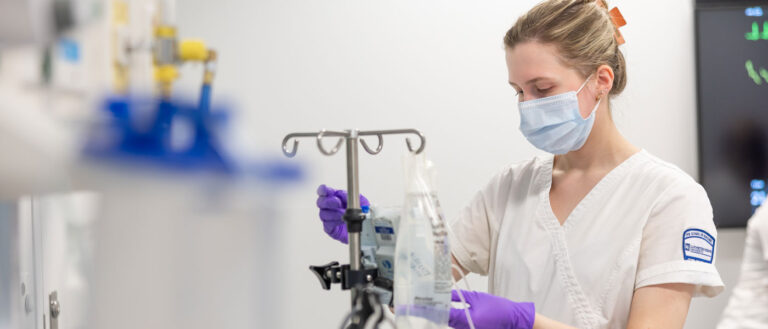Exactly 100 years ago, Frances Payne Bolton gifted Western Reserve University the largest endowment of its time to create an independent school of nursing. As celebratory centennial events take place throughout the year, Nurses Week (May 6-12) and National Nurses Month (recognized in May) offer the perfect opportunity to reflect on nursing education at Case Western Reserve.
Launched in 1994 by the American Nurses Association, Nurses Week celebrates the dedication and work of nurses and reminds us to thank the healthcare professionals who regularly keep us healthy. There are more than 4 million registered nurses in the U.S. as of 2023 and, but as our nation emerges from the COVID-19 pandemic, the need for nurses only continues to grow. Frances Payne Bolton School of Nursing is proud to help answer this call, educating and preparing students to lead in the workforce.
“Nurses serve individual patients as well as entire communities, not just during a single point but throughout a lifetime of health needs,” said Carol Musil, dean of the School of Nursing. “Nurses today serve on the front lines of healthcare, from hospital emergency rooms and elderly care facilities to disaster and conflict zones. Nurses are there to help immediate and long-term needs.”
Get to know more about nursing education at Frances Payne Bolton School of Nursing.
1. The nursing curriculum at CWRU is at the forefront of new, advanced technology—and prepares students to shape healthcare policy.
When new technology is introduced to healthcare facilities, nurses are often the first to use it. So, from the moment students step into the classroom at Frances Payne Bolton School of Nursing, they are at the forefront of emerging healthcare research and technology such as augmented and virtual reality technology.
In simulation labs at the Health Education Campus, staff work to prepare nursing students for every scenario a professional nurse could encounter, including those involving the latest medical devices. And at the Callahan Family Emergency and Critical Care Center and the Dorothy Ebersbach Academic Center for Flight Nursing, nursing students train for real-world scenarios, with helicopter and ambulance simulators that replicate motion, sound and even smell of a crisis zone, plus high-fidelity mannequins that mimic breathing patterns, give birth and even have a pulse.
This academic training prepares our students to serve on the front lines of the industry, where they’ll often need to identify the ground-level effects of health policy. By collecting data to be used for further study, nurses can recognize patterns and begin to develop ways to improve healthcare, giving them a voice to help shape policies. Initiatives like the Marian K. Shaughnessy Nurse Leadership Academy have helped nurses at CWRU hone their skills as executives and decision-makers in order to be the best advocate for patient health and safety.
2. Our nursing faculty conduct incredible research.
What began with Florence Nightingale’s 1859 publication “Notes on Nursing” and her early work with soldiers’ health on the European battlefields has led to millions of dollars in grants funding nursing researchers across the country. At CWRU, nurses have conducted research related to topics such as the identification and assessment of children at risk of developing health problems, women’s health and breast cancer, intervention techniques for mental health patients and studies related to HIV.
This year alone, the National Institutes of Health awarded faculty at the School of Nursing $4.6 million in research funding. Projects include those by faculty such as Shanina Knighton, who is working to combine health science with engineering, developing 3D-printed hand sanitizer devices attached to hospital bed frames, with the goal of improving patient hygiene and reducing bacterial contamination. Another example project is that of Associate Professor Carolyn Harmon Still who is studying self-management and resilience trajectories in African American adults with hypertension.
3. The nursing school has a connection with Florence Nightingale.
Considered a founder of modern nursing, Florence Nightingale visited injured soldiers throughout the Crimean War, helping ease their pain and nurse them to better health. Her efforts earned her the Red Cross of St. George, and led her to organize the first nursing education program at St. Thomas Hospital in London, where she presented graduates with similar medals of recognition. This tradition lived on at Lakeside Hospital School of Nursing (the forerunner to the Frances Payne Bolton School of Nursing) when school administrators sought a way to honor their graduates in 1901. To this day, nursing graduates at all levels from Frances Payne Bolton School of Nursing receive cross-shaped pins that resemble Nightingale’s.

